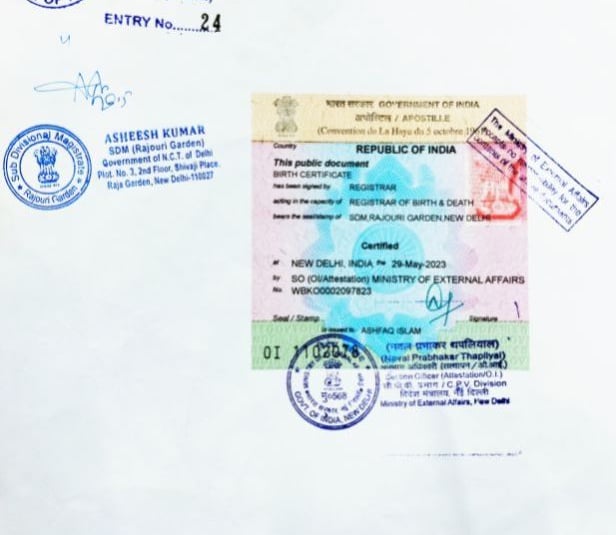Your Degree Abroad Starts Here: HRD and MEA Attestation Process in India
7/15/20254 min read


Understanding Attestation: Importance and Process
Attestation is a vital process for individuals who have completed their degrees abroad and seek to validate their educational credentials in India. This procedure verifies the authenticity of documents, ensuring they are legitimate and in compliance with legal requirements. It is particularly significant for those aspiring to pursue further education, seek employment, or apply for visas within Indian jurisdictions. The legal implications of attestation cannot be understated; it is often a prerequisite for the recognition of foreign degrees, which plays a critical role in facilitating academic and career advancement.
The relevance of document attestation extends beyond mere validation. For students wanting to further their studies in India, attestation serves as an assurance to educational institutions regarding the authenticity of their previous academic credentials. In the job market, verified qualifications are crucial for gaining the confidence of potential employers who may be skeptical about the authenticity of foreign degrees. Likewise, individuals looking to migrate or work abroad must often present attested documents as part of visa applications, making this process indispensable for international mobility.
The attestation process itself involves several key steps. Initially, the individual must gather all necessary documents, including transcripts and degree certificates. These documents are then submitted to the relevant authorities for verification. In India, the attestation process usually involves several layers of verification, including authentication by the local educational institution, followed by the state government, and finally the Ministry of External Affairs. Each stage emphasizes the need for accuracy and validity, ensuring that all educational documents are thoroughly vetted before being accepted in India or abroad.
In conclusion, understanding the attestation process is paramount for individuals who have studied overseas. It not only bridges the gap between international education and local recognition but also enhances prospects for higher education, employment, and immigration opportunities in India.
HRD Attestation: Steps and Requirements
The Human Resource Development (HRD) attestation process is a critical step for individuals looking to validate their academic qualifications obtained in India for use abroad. This process ensures that the documents are recognized by foreign nations and institutions. To initiate the HRD attestation, applicants must prepare a set of specific documents. The essential documents include a duly filled application form, the original degree certificate, and a valid form of identification such as an Aadhaar card or passport. Additionally, any supporting documents that establish the authenticity of the qualification may be required.
Once the necessary documentation is collected, the next step is to visit the respective state HRD office or its designated online portal. It is advisable to first verify the specific process for your state, as procedures can vary. Upon submission, applicants are typically required to pay a fee, which can vary based on the state and the type of document being attested. Processing time can also differ, with a general timeframe ranging from a few days to several weeks, depending on the office workload and efficiency.
Throughout the HRD attestation process, applicants often have questions, such as the legitimacy of their documents or the possibility of expedited services. It is essential to address these concerns proactively by consulting the HRD office or utilizing reliable online resources. Ensuring compliance with all requirements enhances the likelihood of a smooth and successful attestation experience. Overall, HRD attestation stands as a pivotal component for individuals aiming to further their education or professional careers internationally, reinforcing the need to navigate this process with care and diligence.
MEA Attestation: Ensuring Global Recognition
The Ministry of External Affairs (MEA) attestation plays a pivotal role in reinforcing the international credibility of Indian educational documents. This formal verification process serves as a crucial step in validating an individual’s qualifications when seeking opportunities abroad, whether it be for education, employment, or immigration purposes. The MEA attestation acts as a testament to the authenticity of the documents, elevating their standing in foreign jurisdictions where educational qualifications must meet specific recognition standards.
To initiate the MEA attestation process, certain prerequisites must be met, particularly prior completion of HRD attestation. The documents that typically require MEA attestation include degrees, diplomas, and transcripts from recognized institutions. Candidates must present original documents along with their attested copies. Furthermore, applicants are required to submit a government-issued identity proof and a passport-sized photograph, as these serve to confirm the applicant’s identity throughout the process.
The MEA attestation process is systematic and involves several key steps. Initially, the applicant submits their educational documents to an authorized attestation service. Once the HRD attestation is completed, the service then forwards these documents to the MEA for final verification. This stage may take a few days to a few weeks, depending on the volume of applications and specific requirements of the respective foreign country.
The significance of MEA attestation transcends mere formality; it makes a substantial impact on how qualifications are perceived internationally. With the increasing globalization of education and employment opportunities, having MEA-attested documents facilitates successful eligibility assessments in foreign institutions or during visa application processes. Consequently, individuals seeking to establish themselves abroad can benefit tremendously from ensuring that their qualifications are recognized and validated on the global stage.
Tips for a Smooth Attestation Process
Navigating the attestation process can often seem daunting, but with the right strategies in place, individuals can experience a more efficient journey. One essential tip is to choose the right attestation service. It is advisable to conduct thorough research to find reputable agencies that specialize in the HRD and MEA attestation process in India. Look for user reviews and consider recommendations from friends or colleagues who have undergone the process themselves, as this can significantly influence your experience.
Another important aspect is preparing your documents in advance. Individuals should make a comprehensive list of required documents and ensure they are in good condition. This may include academic certificates, identity proofs, and any additional documentation specified by the attestation agency. Organizing these documents not only saves time but also reduces the chances of delays during the processing phase.
Understanding processing times is critical. Each attestation service may have different timelines based on their procedures and the volume of applications they handle. It is wise to check the estimated timeframes provided by the service and anticipate variable factors such as public holidays or unforeseen backlogs. Staying informed can help individuals manage their expectations and plan accordingly.
Common pitfalls to avoid include submitting incomplete or incorrect documents, which can lead to rejections or additional clarifications. Double-check all submissions and be attentive to any instructions provided by the attestation service. Lastly, utilizing resources such as official government websites or helplines can add valuable insights into the process, offering assistance to those seeking further clarification. Remember, patience is key; remaining informed and composed will empower individuals in successfully completing their attestation journey.
Expert
Your trusted partner for document attestation services.
Contact NOw:
Support
+91 9210776391
© 2025. All rights reserved.
